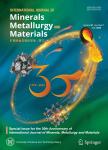A thermodynamic perspective on electrode poisoning in solid oxide fuel cells
固体氧化物燃料电池电极中毒的热力学研究作者机构:Department of Mechanical EngineeringUniversity of South CarolinaColumbiaUSA
出 版 物:《International Journal of Minerals,Metallurgy and Materials》 (矿物冶金与材料学报(英文版))
年 卷 期:2024年第31卷第6期
页 面:1449-1455页
核心收录:
学科分类:0808[工学-电气工程] 081704[工学-应用化学] 08[工学] 0817[工学-化学工程与技术]
基 金:supported by the U.S.Department of Energy’s Office of Energy Efficiency and Renewable Energy(EERE)under the Fuel Cell Technologies Office(FCTO)(No.DE-EE-0008842) the Office of Fossil Energy and Carbon Management under National Energy Technology Lab(No.DE-FE-0032111)
主 题:impurities air fuel reaction activity
摘 要:A critical challenge to the commercialization of clean and high-efficiency solid oxide fuel cell(SOFC)technology is the insuf-ficient stack lifespan caused by a variety of degradation mechanisms,which are associated with cell components and chemical *** components related degradation refers to thermal/chemical/electrochemical deterioration of cell materials under operating conditions,whereas the latter regards impurities in feedstocks of oxidant(air)and reductant(fuel).This article provides a thermodynamic perspective on the understanding of the impurities-induced degradation mechanisms in *** discussion focuses on using thermodynamic ana-lysis to elucidate poisoning mechanisms in cathodes by impurity species such as Cr,CO_(2),H_(2)O,and SO_(2) and in the anode by species such as S(or H_(2)S),SiO_(2),and P_(2)(or PH_(3)).The author hopes the presented fundamental insights can provide a theoretical foundation for search-ing for better technical solutions to address the critical degradation challenges.



